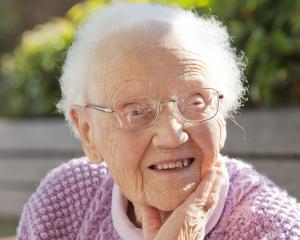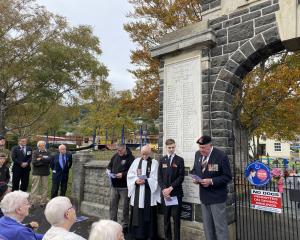Thousands packed around the cenotaph for the Anzac Day dawn service at the Auckland War Memorial Museum this morning.
Australia and New Zealand's national anthems were sung in full voice and mayor Len Brown urged the people of his city to be grateful to those who worked to defend the ideals of justice and freedom.
Now that the service is over, many have chosen to pin their poppies before white crosses in front of the museum.
In Wellington, A firing of a gun heralded in the dawn as thousands gathered in the central city for the dawn parade.
Hundreds of veterans marched along Molesworth Street to the Cenotaph by Parliament buildings before the service started about 5.45am.
The service was attended by Prime Minister John Key, Arts, Culture and Heritage Minister Chris Finlayson and Wellington Mayor Celia Wade-Brown.
Defence Force Vice Chief Major General Tim Keating said for a small nation, New Zealand had always answered the call to defend freedom and protect the vulnerable.
Recently, troops had been pulled from conflict zones such as East Timor and Afghanistan, he said.
They had performed missions "that made us proud" and had made a difference to the lives of those living there.
But foreign war graves were a blunt reminder of the highest price soldiers paid when working in those areas, Major General Keating said.
He spoke about the morning of April 25, 1915, when excited young New Zealand and Australian troops landed on the shores of Gallipoli with "bullets crashing around, held by an enemy they had never seen".
The Western Front claimed 1200 New Zealanders and 2700 New Zealanders were casualties at Passchendaele, he said.
Mr Key and representatives from Australia and Turkey laid wreaths at the Cenotaph.
Principal Defence Chaplain Lance Lukin said we stood together "as people of the world".
"We gather as a declaration to the world that we will never forget."
Wellington Returned and Services Association president Conrad Flickenberg said we were gathered to think of the soldiers who went to war but never returned.
"It is fitting that we should keep this dawn vigil together in remembrance and gratitude.
"We feel them still near us in spirit."
At the end of the service, the war veterans marched away, to the applause of the crowd.
In Christchurch, about 4000 gathered in the dark at Cranmer Square.
A mixture of people, including Scout troops, school children, and families, watched dozens of veterans march into the inner city park, some with family members or friends.
The NZ Army Band played them in, with the crowd clapping.
Christchurch Mayor Bob Parker said the city had made a commitment to those young men going off to war nearly a century ago that they would never be forgotten.
Brian Shanklin, president of the Malayan Veterans Association, said New Zealanders have been fighting since the Boer War for the "principles and freedoms we have inherited".
Master of ceremonies Paul O'Connor paid tribute to the 2721 lives lost in the Gallipoli campaign, as well as the 10 soldiers who recently died in Afghanistan in what was one of the longest deployments in New Zealand military history.
Wreaths to remember the fallen were laid at a temporary cenotaph which was topped by a wooden cross carved by Urban Search and Rescue experts from timbers recovered from the earthquake-crippled Christ Church Cathedral.
White crosses marking the war dead caught the early morning light.
Squadron Leader Patrick Hoare of the RAAF, representing the Australian government and people, asked the gathering to pray that the past soldiers' sacrifice may not have been in vain, and that in due season, their everlasting memorial may be in "Peace on Earth and good will among men".
After a haunting rendition of The Last Post, and a fire of volleys, Reverend Father Dan Doyle said, "We will remember them".
The dawn service ended with the New Zealand national anthem performed by the Army Band and a large number of the public laying their own wreaths and poppies.
"I come every year to remember my old Dad, and I'll never stop till I die," said Bill Johnson, 66, of Christchurch.











